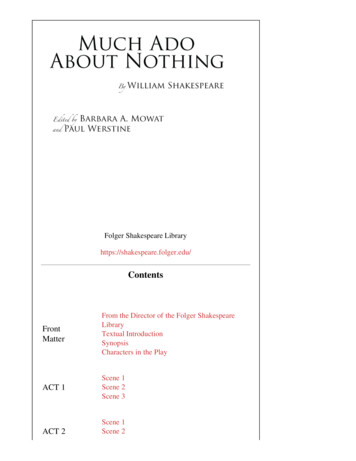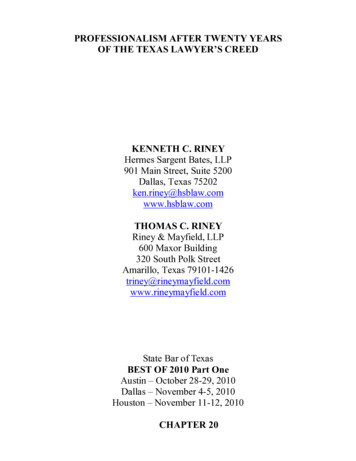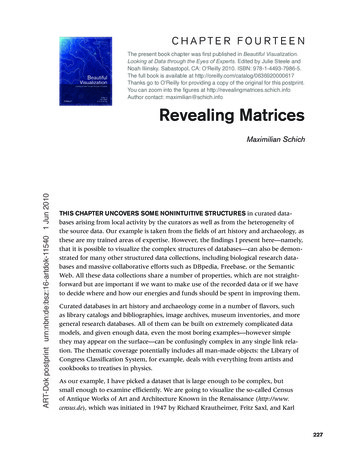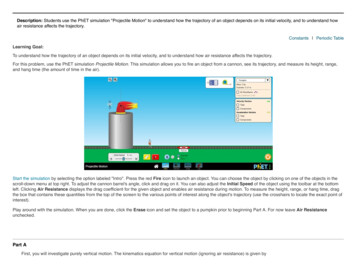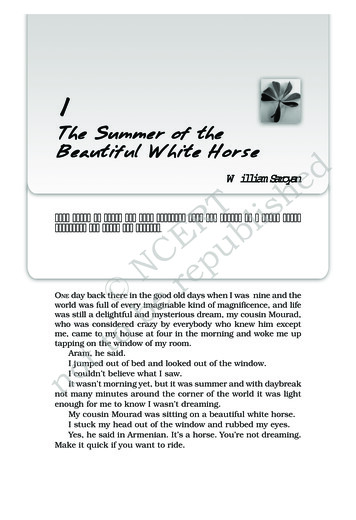
Transcription
TWENTY BEAUTIFUL STORIESFROM SHAKESPEARE
WILLIAM SHAKESPEARE
TWENTYBEAUTIFULSTORIES FROMSHAKESPEARERETOLD BYE. NESBITYESTERDAY’S CLASSICSCHAPEL HILL, NORTH CAROLINA
Cover and arrangement 2006 Yesterday’s Classics.This edition, first published in 2006 byYesterday’s Classics, is an unabridged republication of the work originally published by D. E.Cunningham & Co. in 1907. The illustration onthe cover is by Eleanor Fortescue Brickdale. For acomplete list of books published by Yesterday’sClassics, please visit www.yesterdaysclassics.com.Yesterday’s Classics is the publishing arm of theBaldwin Project which presents the complete textof dozens of classic books for children atwww.mainlesson.com under the editorship of LisaM. Ripperton and T. A. Roth.ISBN-10: 1-59915-029-8ISBN-13: 978-1-59915-029-1Yesterday’s ClassicsPO Box 3418Chapel Hill, NC 27515
PREFACETHE writings of Shakespeare have been justlytermed “the richest, the purest, the fairest, thatgenius uninspired ever penned.”Shakespeare instructed by delighting. Hisplays alone (leaving mere science out of thequestion), contain more actual wisdom than thewhole body of English learning. He is the teacher ofall good—pity, generosity, true courage, love. Hisbright wit is cut out “into little stars.” His solidmasses of knowledge are meted out in morsels andproverbs, and thus distributed, there is scarcely acorner of the English-speaking world to-day whichhe does not illuminate, or a cottage which he doesnot enrich. His bounty is like the sea, which, thoughoften unacknowledged, is everywhere felt. As hisfriend, Ben Jonson, wrote of him, “He was not of anage but for all time.” He ever kept the highroad ofhuman life whereon all travel. He did not pick outby-paths of feeling and sentiment. In his creationswe have no moral highwaymen, sentimental thieves,interesting villains, and amiable, elegant adventuresses—no delicate entanglements of situation, inwhich the grossest images are presented to the minddisguised under the superficial attraction of style andsentiment. He flattered no bad passion, disguised novice in the garb of virtue, trifled with no just and
generous principle. While causing us to laugh atfolly, and shudder at crime, he still preserves ourlove for our fellow-beings, and our reverence forourselves.Shakespeare was familiar with all beautifulforms and images, with all that is sweet or majesticin the simple aspects of nature, of that indestructiblelove of flowers and fragrance, and dews, and clearwaters—and soft airs and sounds, and bright skiesand woodland solitudes, and moon-light bowers,which are the material elements of poetry,—andwith that fine sense of their indefinable relation tomental emotion, which is its essence and vivifyingsoul—and which, in the midst of his most busy andtragical scenes, falls like gleams of sunshine on rocksand ruins—contrasting with all that is rugged orrepulsive, and reminding us of the existence of purerand brighter elements.These things considered, what wonder is itthat the works of Shakespeare, next to the Bible, arethe most highly esteemed of all the classics ofEnglish literature. “So extensively have the characters of Shakespeare been drawn upon by artists,poets, and writers of fiction,” says an Americanauthor,—“So interwoven are these charac-ters in thegreat body of English literature, that to be ignorantof the plot of these dramas is often a cause ofembarrassment.”But Shakespeare wrote for grown-up people,for men and women, and in words that little folkscannot understand.
Hence this volume. To reproduce theentertaining stories contained in the plays ofShakespeare, in a form so simple that children canunderstand and enjoy them, was the object had inview by the author of these Beautiful Stories fromShakespeare.And that the youngest readers may notstumble in pronouncing any unfamiliar names to bemet with in the stories, the editor has prepared andincluded in the volume a Pronouncing Vocabulary ofDifficult Names. To which is added a collection ofShakespearean Quotations, classified in alphabeticalorder, illustrative of the wisdom and genius of theworld’s greatest dramatist.E. T. R.
A BRIEF LIFE OFSHAKESPEAREIN the register of baptisms of the parishchurch of Stratford-upon-Avon, a market town inWarwickshire, England, appears, under date of April26, 1564, the entry of the baptism of William, theson of John Shakspeare. The entry is in Latin—“Gulielmus filius Johannis Shakspeare.”The date of William Shakespeare’s birth hasusually been taken as three days before his baptism,but there is certainly no evidence of this fact.The family name was variously spelled, thedramatist himself not always spelling it in the sameway. While in the baptismal record the name isspelled “Shakspeare,” in several authentic autographsof the dramatist it reads “Shakspere,” and in the firstedition of his works it is printed “Shakespeare.”Halliwell tells us, that there are not less thanthirty-four ways in which the various members ofthe Shakespeare family wrote the name, and in thecouncil-book of the corporation of Stratford, whereit is introduced one hundred and sixty-six timesduring the period that the dramatist’s father was amember of the municipal body, there are fourteendifferent spellings. The modern “Shakespeare” is notamong them.
Shakespeare’s father, while an alderman atStratford, appears to have been unable to write hisname, but as at that time nine men out of ten werecontent to make their mark for a signature, the factis not specially to his discredit.The traditions and other sources ofinformation about the occupation of Shakespeare’sfather differ. He is described as a butcher, a woolstapler, and a glover, and it is not impossible that hemay have been all of these simultaneously or atdifferent times, or that if he could not properly becalled any one of them, the nature of his occupationwas such as to make it easy to understand how thevarious traditions sprang up. He was a landedproprietor and cultivator of his own land evenbefore his marriage, and he received with his wife,who was Mary Arden, daughter of a countrygentleman, the estate of Asbies, 56 acres in extent.William was the third child. The two older than hewere daughters, and both probably died in infancy.After him were born three sons and a daughter. Forten or twelve years at least, after Shakespeare’s birthhis father continued to be in easy circumstances. Inthe year 1568 he was the high bailiff or chiefmagistrate of Stratford, and for many yearsafterwards he held the position of alderman as hehad done for three years before. To the completionof his tenth year, therefore, it is natural to supposethat William Shakespeare would get the besteducation that Stratford could afford. The freeschool of the town was open to all boys, and like all
the grammar-schools of that time, was under thedirection of men who, as graduates of theuniversities, were qualified to diffuse that soundscholarship which was once the boast of England.There is no record of Shakespeare’s having been atthis school, but there can be no rational doubt thathe was educated there. His father could not haveprocured for him a better education anywhere. Tothose who have studied Shakespeare’s works withoutbeing influenced by the old traditional theory that hehad received a very narrow education, they aboundwith evidences that he must have been solidlygrounded in the learning, properly so called, taughtin the grammar schools.There are local associations connected withStratford which could not be without their influencein the formation of young Shakespeare’s mind.Within the range of such a boy’s curiosity were thefine old historic towns of Warwick and Coventry,the sumptuous palace of Kenilworth, the grandmonastic remains of Evesham. His own Avonabounded with spots of singular beauty, quiethamlets, solitary woods. Nor was Stratford shut outfrom the general world, as many country towns are.It was a great highway, and dealers with every varietyof merchandise resorted to its markets. The eyes ofthe poet dramatist must always have been open forobservation. But nothing is known positively ofShakespeare from his birth to his marriage to AnneHathaway in 1582, and from that date nothing but
the birth of three children until we find him an actorin London about 1589.How long acting continued to beShakespeare’s sole profession we have no means ofknowing, but it is in the highest degree probable thatvery soon after arriving in London he began thatwork of adaptation by which he is known to havebegun his literary career. To improve and alter olderplays not up to the standard that was required at thetime was a common practice even among the bestdramatists of the day, and Shakespeare’s abilitieswould speedily mark him out as eminently fitted forthis kind of work. When the alterations in playsoriginally composed by other writers became veryextensive, the work of adaptation would become inreality a work of creation. And this is exactly whatwe have examples of in a few of Shakespeare’s earlyworks, which are known to have been founded onolder plays.It is unnecessary here to extol the publishedworks of the world’s greatest dramatist. Criticism hasbeen exhausted upon them, and the finest minds ofEngland, Germany, and America have devoted theirpowers to an elucidation of their worth.Shakespeare died at Stratford on the 23d ofApril, 1616. His father had died before him, in 1602,and his mother in 1608. His wife survived him tillAugust, 1623. His son Hamnet died in 1596 at theage of eleven years. His two daughters survived him,the eldest of whom, Susanna, had, in 1607, married aphysician of Stratford, Dr. Hall. The only issue of
this marriage, a daughter named Elizabeth, born in1608, married first Thomas Nasbe, and afterwardsSir John Barnard, but left no children by eithermarriage. Shakespeare’s younger daughter, Judith, onthe 10th of February, 1616, married a Stratfordgentleman named Thomas Quincy, by whom shehad three sons, all of whom died, however, withoutissue. There are thus no direct descendants ofShakespeare.Shakespeare’s fellow-actors, fellow-dramatists,and those who knew him in other ways, agree inexpressing not only admiration of his genius, buttheir respect and love for the man. Ben Jonson said,“I love the man, and do honor his memory, on thisside idolatry, as much as any. He was indeed honest,and of an open and free nature.” He was buried onthe second day after his death, on the north side ofthe chancel of Stratford church. Over his grave thereis a flat stone with this inscription, said to have beenwritten by himself:Good friend for Jesus sake forbeareTo digg the dust encloased heare:Blest be ye man yt spares these stones,And curst be he yt moves my bones.
CONTENTSA MIDSUMMER NIGHT’S DREAM1THE TEMPEST13AS YOU LIKE IT23THE WINTER’S TALE31KING LEAR43TWELFTH NIGHT49MUCH ADO ABOUT NOTHING59ROMEO AND E COMEDY OF ERRORS128THE MERCHANT OF VENICE140TIMON OF ATHENS150OTHELLO165THE TAMING OF THE SHREW179MEASURE FOR MEASURE190TWO GENTLEMEN OF VERONA201ALL’S WELL THAT ENDS WELL215PRONOUNCING VOCABULARY OF NAMES227QUOTATIONS FROM SHAKESPEARE230
A MIDSUMMER NIGHT’SDREAMHERMIA and Lysander were lovers; butHermia’s father wished her to marry another man,named Demetrius.Now, in Athens, where they lived, there was awicked law, by which any girl who refused to marryaccording to her father’s wishes, might be put todeath. Hermia’s father was so angry with her forrefusing to do as he wished, that he actually broughther before the Duke of Athens to ask that she mightbe killed, if she still refused to obey him. The Dukegave her four days to think about it, and, at the endof that time, if she still refused to marry Demetrius,she would have to die.Lysander of course was nearly mad with grief,and the best thing to do seemed to him for Hermiato run away to his aunt’s house at a place beyond thereach of that cruel law; and there he would come toher and marry her. But before she started, she toldher friend, Helena, what she was going to do.Helena had been Demetrius’ sweetheart longbefore his marriage with Hermia had been thoughtof, and being very silly, like all jealous people, she1
BEAUTIFUL STORIES FROM SHAKESPEAREcould not see that it was not poor Hermia’s fault thatDemetrius wished to marry her instead of his ownlady, Helena. She knew that if she told Demetriusthat Hermia was going, as she was, to the woodoutside Athens, he would follow her, “and I canfollow him, and at least I shall see him,” she said toherself. So she went to him, and betrayed herfriend’s secret.TITANIA: THE QUEENTHE FAIRIESNow this wood whereLysander was tomeet Hermia,and where theother two haddecided to follow them, wasfull of fairies,as most woodsare, if oneonly had theeyes to seethem, and in this woodon this night were theKing and Queen of thefairies, Oberon andTitania. Now fairiesare very wise people,but now and thenthey can be quite asfoolish as mortalfolk. Oberon andTitania, who mightOFhave been as happy2
A MIDSUMMER NIGHT’S DREAMas the days were long, had thrown away all their joyin a foolish quarrel. They never met without sayingdisagreeable things to each other, and scolded eachother so dreadfully that all their little fairy followers,for fear, would creep into acorn cups and hide themthere.So, instead of keeping one happy Court anddancing all night through in the moonlight as isfairies’ use, the King with his attendants wanderedthrough one part of the wood, while the Queen withhers kept state in another. And the cause of all thistrouble was a little Indian boy whom Titania hadtaken to be one of her followers. Oberon wanted thechild to follow him and be one of his fairy knights;but the Queen would not give him up.On this night, in a mossy moonlit glade, theKing and Queen of the fairies met.“Ill met by moonlight, proud Titania,” saidthe King.“What! jealous, Oberon?” answered theQueen. “You s
entertaining stories contained in the plays of Shakespeare, in a form so simple that children can understand and enjoy them, was the object had in view by the author of these Beautiful Stories from Shakespeare. And that the youngest readers may not stumble in pronouncing any unfamiliar names to be met with in the stories, the editor has prepared and included in the volume a Pronouncing .




